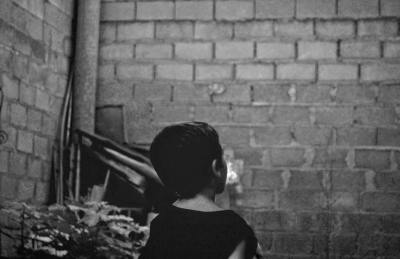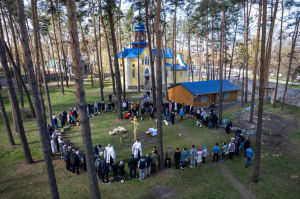Families are the real heroes of the 'COVID orphan' crisis

Anil* was a pastor living in Pune, India, with his wife, Seema*, and their two daughters. In March of 2021, Anil contracted COVID-19. Like too many others in his situation, his health quickly declined and the medical bills began to pile up.
The local church community soon rallied around Anil and his family by providing financial support, allowing him to remain at the hospital to receive the care he needed. After he was placed on a ventilator in the Intensive Care Unit (ICU), his condition began to improve. He believed he was on the road to recovery and even gave up his spot in the ICU to someone else.
Tragically, Anil’s improvements were short-lived. His condition rapidly deteriorated and he passed away at the end of April 2021.
Anil’s daughters were just 1 and 5 years old at the time, and his wife Seema was suddenly solely responsible for caring for them. The family was able to stay with Seema’s elderly mother, but they were still in dire need of support.
Upon learning of Seema and her daughters’ situation after Anil’s death, my team and I sprang into action. In 1999, my late husband and I founded Vanitashray with a vision to help care for underprivileged women and children. Since then, our organization has had the honor of caring for, nurturing and educating hundreds of women and children in need, and our work hasn’t stopped during the pandemic. We’ve provided direct and critical support to families affected by COVID-19-associated loss.
Sadly, Anil’s daughters are among an overwhelming number of children who are now facing the world without one of their caregivers. A new Lancet paper reports an estimated 5.2 million children have lost a caregiver to COVID-19. Each child who has been orphaned due to COVID-19 is experiencing unimaginable heartache — and to compound matters, the tragic reality is many of these children are also now at a significantly higher risk of exploitation, abuse, poverty, trauma and separation from their living family members.
Yes — living family members. These children may have all lost a primary or secondary caregiver, but the vast majority of them have remaining parents or other living relatives who are now caring for them. When people hear the term "orphan," they might assume they are completely alone, in need of an orphanage to take them in, or a brand-new family to adopt them.
But the truth is, these children still have families of their own — resilient families who are most likely struggling with the loss of a loved one and the challenges that come with caring well for children in a pandemic-stricken world.
There are no caregivers better equipped to nurture a child who has experienced loss than their own family. That may seem like common sense, but after similar crises in the past, compassionate donors from around the world were quick to expand residential care facilities, like orphanages and children’s homes, to help care for the affected children.
Now when we look back at the effectiveness of this response during crises like the HIV/AIDS epidemic, we can see that it separated families and ultimately caused more harm than good. This time, we must direct our support to the families stepping up despite their bleak circumstances.
I know the harm growing up without a family can cause firsthand. At only ten months old, I was abandoned by my biological mother and placed in an orphanage where I lived for the next 16 years. I spent many nights crying out for a family. My basic material needs were met, but my deeper need for a sense of belonging and the love of a family was not.
I’ve since dedicated my life to caring for orphaned and vulnerable women and children like myself. When I first began this work, I opened an orphanage, unaware of the alternative forms of care that are possible for most children. It wasn’t long before I was confronted with the many issues that accompany running an orphanage. Raising funds and finding quality caregivers was a struggle, and my frustration pushed me to investigate the root causes of family separation in my community.
Poverty, food insecurity, lack of access to education and daytime childcare — I soon discovered these were the reasons that children were ultimately being separated from their loving families. I also came to understand that these were issues that could be addressed, and families could be strengthened before they were torn apart. I don’t run an orphanage anymore because facilities aren’t necessary when families are properly supported.
At Vanitashray, we’ve had the opportunity to serve many families impacted by COVID-19-associated loss throughout the past two years. Working with these families has tremendously deepened my admiration for surviving family members who have risen to the occasion and cared for these vulnerable children.
I often think about Seema and her daughters; their strength and determination inspire me. After first contacting them about their situation, our organization was able to step in and quickly meet their most pressing physical, mental and emotional needs.
I personally reached out to Seema, who needed that emotional support in her devastation. Vanitashray was able to provide their family with monthly groceries and direct financial support. We also helped Seema raise funds for her daughters’ education so they could stay in school. She later joined a local WhatsApp group created for grief and bereavement support. Seema began volunteering in her community alongside Vanitashray, giving back because she had received so much.
By supporting efforts that empower and bring relief to families facing loss — families like Seema’s — together we can create better environments for millions of vulnerable children and their living caregivers. This direct assistance from people and organizations based in their community is life-changing. With our help, they can continue fighting the good fight, and more children can stay right where they belong — with their families.
*Names have been changed per protection policy.
Anu Silas is the founder and director of Vanitashray, an NGO in India committed to bring forth the best child-care practices, family preservation, adoption, and caring for the destitute, widows, and young girls.



























